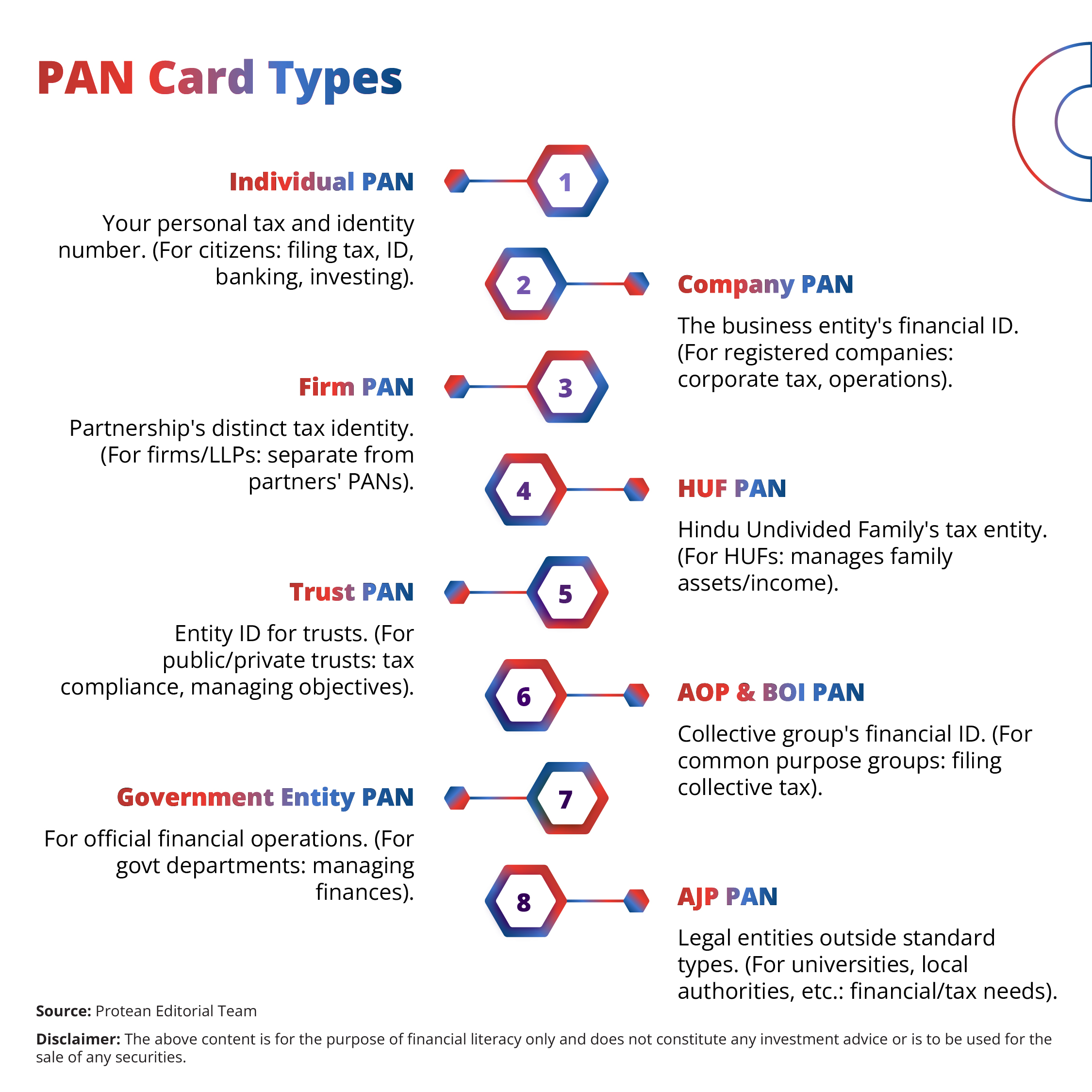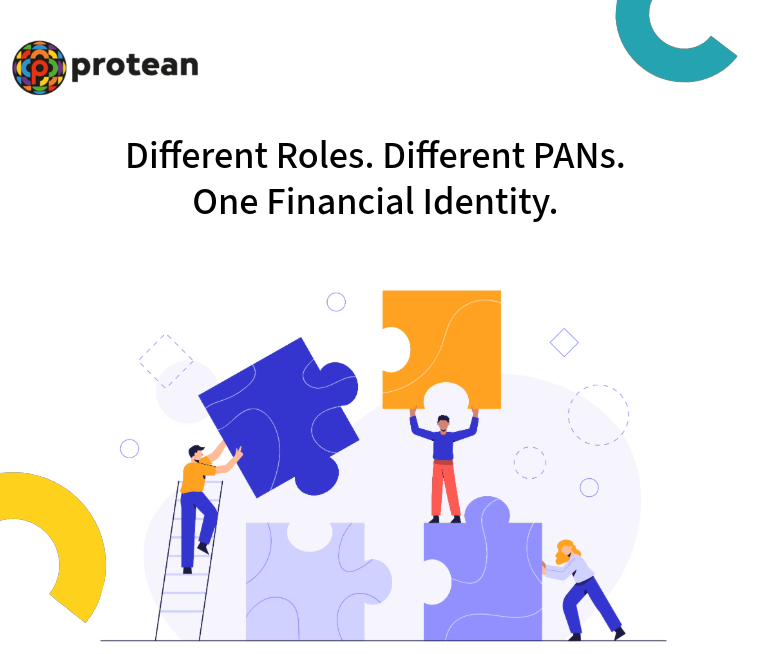Your PAN or Permanent Account Number is the cornerstone of your Indian financial identity. But is there a single PAN type applicable for everyone?
The Indian tax authorities issue various types of PAN card. Each of these different PAN card types India caters to a distinct category of entity recognised under the law.
| Let us understand the types of PAN card available in India and shed light on who needs which type and why. |
The Most Common: PAN Card for Individuals
One of the most recognised types of PAN card is the one issued to individual Indian citizens. This category can encompass virtually every resident Indian. I can include the following:
- Salaried employees,
- Self-employed professionals,
- Business owners,
- Students,
- Minors, and even
- Senior citizens
You require an individual PAN card for filing your income tax returns. Furthermore, it is accepted as your identity proof and you also require an individual PAN card for opening a bank account, making significant investments in stocks, mutual funds, or property, and applying for loans all necessitate a valid individual PAN.
| Click on this link to check our PAN services. |

For the Business World: PAN Card for Companies
Companies registered under the Companies Act, 1956 or the Companies Act, 2013, whether private limited or public limited, must obtain a dedicated PAN card.
A company's PAN card serves as its distinct identifier for all financial and legal operations. It is indispensable for fulfilling tax obligations, including filing corporate tax returns. A company PAN card or a firm PAN card can facilitate seamless business transactions, enable opening corporate bank accounts, and become mandatory for various regulatory filings with government bodies. Unlike an individual PAN, the company PAN card represents the legal entity itself, not the individual directors or shareholders.
Partnerships and Beyond: PAN Card for Firms
Partnership firms, including those registered as Limited Liability Partnerships (LLPs), also operate as distinct legal and financial entities. Consequently, they must obtain a separate PAN card, different from the individual PANs held by the partners.
Apart from tax liability and compliance, it’s required for conducting business dealings, entering into contracts, and executing legal agreements in the firm's name. Obtaining a firm PAN card clearly demarcates the financial activities of the partnership from the personal finances of its individual partners. Thus, this is one of the main categories within the various types of PAN card.
| Learn about maximising PAN benefits here. |
Family as an Entity: PAN Card for Hindu Undivided Families (HUFs)
In India, HUFs hold the status of a separate legal entity for the purpose of taxation. With this unique structure families can manage ancestral property and income collectively with HUF PAN card.
The HUF's financial affairs are typically managed by the 'Karta', who is usually the senior-most male member of the family. However, the PAN card is issued in the name of the HUF as an entity, not the Karta individually.
Serving a Purpose: PAN Card for Trusts
Trusts are established for various purposes such as public charity, private benefit, or specific objectives. They are also recognised as separate entities requiring a trust PAN card. This applies to public trusts, private trusts, charitable trusts, and more.
A trust PAN card is one of the types of PAN card, used for:
- Tax compliance,
- Managing donations received,
- Carrying out the stated objectives of the trust.
- Operate bank accounts in trust’s name,
- Hold assets as a trust,
- Engage in financial activities necessary for fulfilling its purpose.
The trust PAN separates the financial identity of the trust from that of its trustees.
Collective Entities: PAN Card for Association of Persons (AOPs) and Body of Individuals (BOIs)
When groups of individuals or entities come together for a common purpose, they might form an Association of Persons (AOP) or a Body of Individuals (BOI). These collective entities, even if not formally registered as companies or firms, are treated as separate accessible entities under income tax law and must obtain an association of persons PAN and body of individuals PAN.
Main purposes are:
- Filing income tax returns,
- Managing shared finances,
- Undertaking financial transactions related to their collective activity.
- Calculate appropriate taxation for income generated by the AOP or BOI at the entity level, distinct from the individual income of its members.
| Apply for PAN in just four simple steps. Click here. |
Government's Identity: PAN Card for Government Entities
Even government departments and entities operating at various levels require PAN cards. These PANs facilitate:
- Financial operations,
- Budget management,
- Compliance with tax regulations wherever applicable.
Legal Personalities: PAN Card for Artificial Juridical Persons (AJPs)
The category of Artificial Juridical Persons (AJPs) encompasses entities recognised as legal persons by law but do not fit neatly into the other categories like individuals, companies, firms, HUFs, trusts, AOPs, or BOIs. This can include entities such as universities, local authorities (like municipalities or panchayats), statutory bodies, and others granted legal authority.
AJPs are required to obtain a PAN card. It covers a diverse range of entities that play a significant role in the public or semi-public domain.
Conclusion
The PAN card system in India provides a comprehensive framework for tracking financial activity across a wide spectrum of entities, from single persons to large corporations and unique collective bodies. It is crucial for anyone engaging in significant financial transactions or navigating the Indian tax system to understand these different types of PAN card. Awareness of these distinctions ensures that you or your entity obtains the correct identification, facilitating compliance and financial management.
| Apply for PAN now as per your applicant category. |

